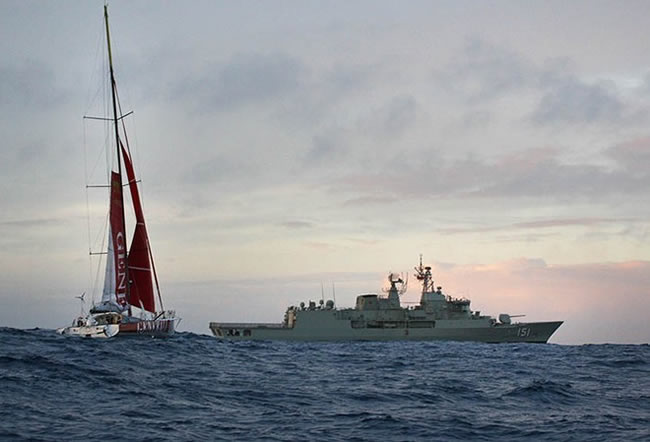The Aussie navy again rescues a yachtsman in the Southern Ocean.
The frigate ‘Arunta’ raced from Fremantle to rescue yachtsman Yann Elies from the southern Indian Ocean off the south coast of WA. Elies was confined to his bunk with a broken leg, unable to reach painkillers or food while he waited for rescuers. He could get to the radio so his rescuers knew that he was in great pain. The only thing he had to sustain him for two days while he waited for rescuers was a bottle of Coke!
Again the navy staged a very successful rescue, showing the high level of professionalism they are renowned for. But the successful nature of the rescue again raised questions of who should pay for such a rescue. There’s a lot of money involved. According to some estimates it cost the Australian taxpayer $4 million! Others reckon it was only $1 million. Which seems such a lot of money. After all these guys go out there by their own choice, racing boats in the most dangerous parts of the world, nobody makes them do it. So why should the taxpayer be forced to cough up huge amounts of money to rescue them?

The money side is perhaps not as bad as it sounds. The navy runs its boats anyway. The ‘Arunta’ doesn’t sit in port doing nothing when there isn’t a rescue happening. The crew still get paid. So the cost of the rescue is really only the additional cost that is incurred on top of the normal operating costs of running the frigate on a daily basis. And it does cost more to go belting through big seas racing to get to an injured person as quickly as possible. But not that much more!

It makes you wonder what the navy thinks of all this? Are they unhappy that they have to carry out this rescue? Does it blow their budget out of the water? I haven’t spoken to them, but I’m willing to bet that they love it! A real-life rescue, where they can put the skills they have learned to the test! Having a reason to push the ship to its limits. Testing the navigation skills of the crew. Even with modern navigation equipment finding a yacht in a vast empty ocean is still a pretty neat trick! Rescue techniques when they got there. Getting the rubber boat over the side in rough seas and over to the yacht and then stabilising the yachtsman and loading him on to the boat and then back on to the ship. They have trained for this and now they have the opportunity to do it in real life. Its priceless! If they are called to make rescues in a war situation this experience will be of great benefit to them!
Australia large map. Great planning map!
So what did it really cost the Australian taxpayer? I put it to you that it cost them nothing! Not a brass razoo! The ships have to run anyway, and the training was invaluable.
And this doesn’t even count the value of the human life involved. Are we as a nation going to ignore a man lying in his bunk in agony? Just let him die out there on the lonely ocean?

It raises the question of how do we view those among us who dare to push their personal limits. How do we as a society think about the adventurers who explore the boundaries of human experience? Thats what these round the world races are all about – exploring the boundaries, pushing them a little further. In that sense its no different than an athlete preparing for the Olympics. Or the surgeon developing a new technique. Or the geek inventing a new computer function. Or the person who walks across Australia with just camels for company. All of them are at the boundaries. And sometimes things go wrong. Sometimes athletes are injured. Are we going to leave them on the floor of the arena saying ‘Well, you got yourself into this, you didn’t have to do it, so we are not going to rescue you, you can go and sort yourself out!.?
In Australia’s past it was the explorers who went out and tested the boundaries. And when they went missing search parties were sent out. Sometimes they brought back explorers. Sometimes they found bones. And sometimes they found nothing, nothing but a mystery. But they searched anyway.
We do that because we are human beings who care for each other. But its more than that. Its also a recognition that those who explore the boundaries do so on behalf of all of us. Thats one reason we go to see athletic events like the Olympics. Those athletes in a sense represent the human race striving to get better. Its not just them, because they are part of us, so its us out there striving, at the very edge of human ability, human experience.
So these guys who are out there in the lonely seas pushing their bodies and minds to the limits of human endurance are doing it on behalf of us. Should we then abandon them if something goes wrong? Should we say ‘Tough, its your problem, mate!’? Aside from the un-human-ness of such a response, that would be saying that we don’t want to explore, to develop any more. That our society is good enough now. That human endeavour has gone far enough. That would be condemning our society to an intolerable mediocrity!
So I say, lets encourage the adventurers. Back them up when things go wrong. Rescue them when they need it. Its not just them, its us. They are part of us, and doing it for us!
This page Copyright © ThisisAustralia.au


All the labels you use every day, with excellent service! EveryLabels.com.au
Australia large map. Great planning map!

